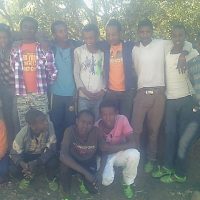[ *** The report is available in pdf format at the bottom of this page]
The information presented in the report is a result of a 7-month monitoring project, conducted by the INTERKULTURALNI PL Association between January and July 2011. The monitoring measures were funded by the Stefan Batory Foundation within the Democracy in Action – civic scrutiny programme. A long-term objective of the project is to facilitate foreigners to work and live in Krakow.
The first and essential problem of any foreigner who wishes to stay in Poland for a longer period of time is to go through the multi-stage procedure for legalising a stay. We have decided to monitor the way the offices in Cracow cope with dealing with foreigners. We have also monitored the activities by the Police and the Border Guard, which can control the legality of foreigners’ stays. Moreover, considering the great number of international tourists visiting Cracow every year, we have examined the spots which have been qualified as problematic and essential from their point of view. Therefore, the adjustment of railway and bus stations along with the local means of transportation has been covered by the study.
Apart from collecting objective data through questionnaires and surveys, we asked foreigners and officers at the spots and institutions in question about their opinions. We also arranged a number of visits by “mystery customers” to offices and railway stations. To the analysis on the Border Guard we attached the case study of a widely discussed case of arresting the Mongolian Batdavva family.
Currently, almost 5 thousand foreigners live in Krakow, which makes up less than 1 % of the city’s population. As for a European agglomeration it is quite rare. Moreover, merely one thousand and a half of foreigners, i.e. 0.16 % of Krakow’s population have a permit for a regular stay, meaning that they have in fact settled in the area of our city.
According to the recent study by EUROSTAT, the Republic of Poland has the smallest percentage of foreigners compared to the total EU population. Given that we have one of the highest coefficients of net migration (more persons leaving the country than coming in), the threat of depopulation in our country may be real. One of our objectives was therefore to distinguish the causes contributing to the fact that Krakow, or in a broader sense, our country is closed to migration and accepting foreigners.
The legalization system in Poland is one of the most complex ones in Europe. In the questionnaire, almost a half of foreigners declared that in the process of legalizing a stay a great amount of bureaucracy of the procedure itself poses difficulties.
It consists of many stages and requires collecting a great amount of documentation, part of which needs to be translated into Polish.
The legality of a foreigner’s stay may be subject to control at any time. It is carried out by the Boarder Guard or, occasionally, by the Police. During the control, a foreigner is obliged to show his passport and residence card, but also other documents proving the legality of their stay. In case of their lack during a control, a foreigner is taken into custody for further questioning, which may last up to 48 hours. Additionally, inspections are often carried out far beyond decency principles and democratic standards. Identifying persons for control activities is often based on racist and ethnical presumptions. It also happens that the Border Guard arranges some kind of “raids” (e.g. controls of all the customers dining in an Armenian restaurant), which implies all the worst possible associations.
The concepts of an illegal stay and the status of an illegal immigrant are concerned as the major social threats nowadays. However, there is no empirical evidence which would prove the existence of this kind of threat, whether for the employment market or the legal order. On the contrary, due to the cooperation with the police, we have acquired a collection of data, implying that foreigners incidentally commit crimes or offences, however, they more often become victims of crimes, including crimes related to abuse by employers.
In general, in the conducted study, we have differentiated the following problem categories:
– Bureaucracy, containing flexibility in terms of the number and kind of documentation required as well as lack of satisfying and comprehensive information available
– Language barrier – lack of sufficient markings in foreign languages, procedures conducted completely in Polish and necessity for the documentation to be translated, lack of skills in terms of understanding persons dealing with foreigners in many situations
– Lack of uniform standards of conduct leading to diametrically different assessments of institutions’ adjustment to foreigners needs, depending on the contact with a particular official
Requirements and recommendations:
– Change in attitude to foreigners: they are to be helped, approached in such a way that they feel the need to integrate with our society and feel good in Krakow
– Allocation of greater amounts of financial funds for the activity of the Foreigners’ Affairs Unit, which would allow improving the standard of services and acceleration of procedures. It is necessary to arrange separate, isolated interview rooms as well as a separated information centre, where an English and Russian speaking person will be employed
– In every institution dealing with foreigners there should be a person employed, who is able to communicate with foreigners and provide them with reliable and complete information
– In every office, there should be a written notice, at least in English, explaining the procedure to the foreigner and pointing to a competent contact person
– Public transport institutions should invest in language trainings for their employees. It is also essential to provide markings in English in the public areas of railway stations as well as tram and bus stops. The Tourist Information Centre should be located directly at the railway station and not at the Słowacki Theatre. The PKP, RDA and MPK institutions should take a greater advantage of the cooperation with the UMK Tourist Department.
– Every institution dealing with foreigners should improve the Internet communication tools
– Within their activities, the Border Guard should first of all carry out operational tasks and not go beyond the information obtained while controlling the legality of a stay and beyond the commissioned environmental inquiry. The arrest procedure and placing foreigners in a centre for illegal immigrants should consider principles of humanitarian treatment, consisting of food provision while being in custody and the right to collect personal properties, notify relatives, etc. before being placed in a guarded centre. The standard control of the legality of a stay should be limited to the inspection of the passport validity and the residence card.
Most of the institutions are willing to cooperate and welcome possible changes, which was proved by a press conference held on 28 July 2011.




